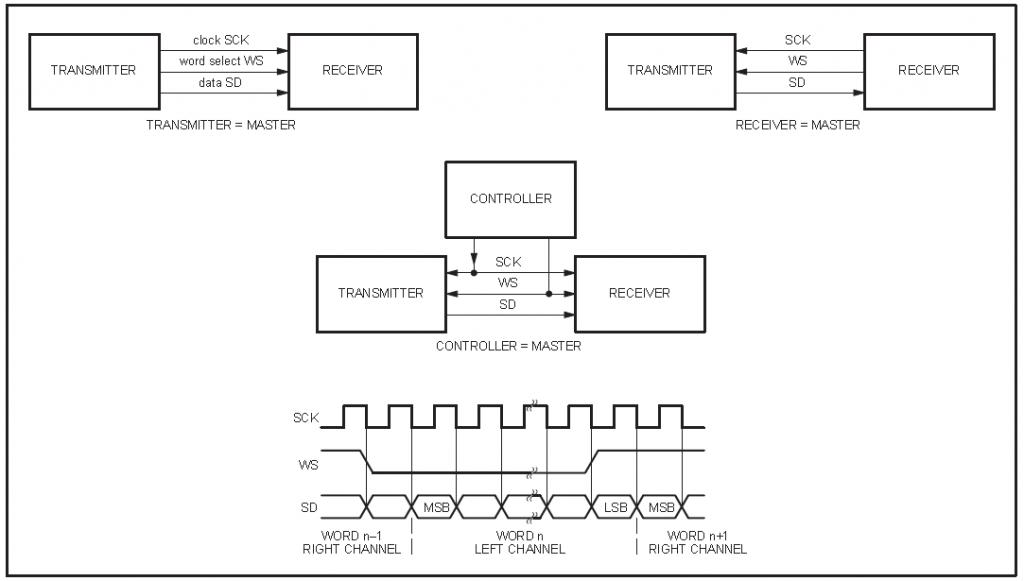I2S数字音频连接总线协议
I²S(Inter-IC Sound或Integrated Interchip Sound)是飞利浦公司制定的一种数字音频标准,于1986年发布,最近的一次修改是1996年。该总线适用于音频设备之间的数据传输,现已广泛应用于各种多媒体系统。它的时钟信号与音频数据流分离,与需要时钟恢复的系统相比,抖动比较低,为用户节省了购买抵抗音频抖动的专业设备的费用。
I²S总线规范
I²S至少有三条信号线:
- SCK: (continuous serial clock) 串行时钟, 对应数字音频的每一位数据,SCK都有1个脉冲。SCK的频率=2×采样频率×采样位数。
- WS: (word select) 字段(声道)选择,用于切换左右声道的数据。WS的频率等于采样频率。声道选择线表明了正在被传输的声道。
- WS为“1”表示正在传输的是左声道的数据。
- WS为“0”表示正在传输的是右声道的数据。
- WS可以在串行时钟的上升沿或者下降沿发生改变,并且WS信号不需要一定是对称的。在从属设备端,WS在时钟信号的上升沿发生改变。
- WS总是在最高位传输前的一个时钟周期发生改变,这样可以使从属设备得到与被传输的串行数据同步的时间,并且使接收端存储当前的命令以及为下次的命令清除空间。
- SD: (serial data) 串行数据,用二进制补码表示的音频数据。 I²S格式的信号无论有多少位有效数据,数据的最高位总是被最先传输(在WS变化(也就是一帧开始)后的第2个SCK脉冲处),因此最高位拥有固定的位置,而最低位的位置则是依赖于数据的有效位数。
这就使得接收端与发送端的有效位数可以不同。如果接收端能处理的有效位数少于发送端,可以放弃数据帧中多余的低位数据;如果接收端能处理的有效位数多于发送端,可以自行补足剩余的位(常补足为零)。
这种同步机制使得数字音频设备的互连更加方便,而且不会造成数据错位。为了保证数字音频信号的正确传输,发送端和接收端应该采用相同的数据格式和长度。当然,对I²S格式来说数据长度可以不同。
对于系统而言,产生SCK和WS的信号端就是主设备,用MASTER表示,简单系统示意图如下图所示
历史
此标准是Philips (后来为NXP,现在位Qualcomm)于1986年推出的,最后一个版本修订于1996年. The I²S protocol outlines one specific type of PCM digital audio communication with defined parameters outlined in the Philips specification.
The bit clock pulses once for each discrete bit of data on the data lines. The bit clock frequency is the product of the sample rate, the number of bits per channel and the number of channels. So, for example, CD Audio with a sample frequency of 44.1 kHz, with 16 bits of precision and two channels (stereo) has a bit clock frequency of:
44.1 kHz × 16 × 2 = 1.4112 MHz The word select clock lets the device know whether channel 1 or channel 2 is currently being sent, since I²S allows two channels to be sent on the same data line. For stereo material, the I²S specification states that left audio is transmitted on the low cycle of the word select clock and the right channel is transmitted on the high cycle. The word select clock is a 50% duty-cycle signal that has the same frequency as the sample frequency.
Data are encoded in two's complement with the MSB (most significant bit) first.
The bus consists of at least three lines:
Bit clock line Word clock line - also called word select (WS) or left right clock (LRCLK) At least one multiplexed data line It may also include the following lines:
Master clock (typical 256 x LRCLK) A multiplexed data line for upload In audio equipment the I²S is sometimes used as an external link between the CD transport and a separate DAC box, as opposed to purely internal connection within one player box. This could be used as an alternative to the commonly used AES/EBU or Toslink or S/PDIF standards. There is no standard interconnecting cable for this application. Some manufacturers provide simply three BNC connectors, an 8P8C (“RJ45”) socket or a DE-9 connector. Others like Audio Alchemy (now defunct) used DIN connectors.
